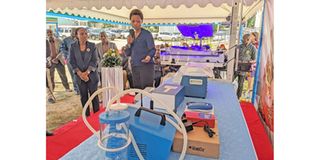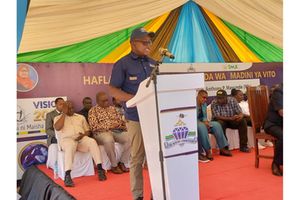Transforming newborn care in Tanzania

A nurse from Ubungo District Hospital explains new equipment to the Deputy Permanent Secretary of the Ministry of Health, Dr Grace Magembe, which will support the neonatal ward at the hospital. PHOTO | RAMADHAN ISMAIL
What you need to know:
- The World Health Organization reports alarming statistics, indicating 27 deaths per 1000 live births in this region, underscoring the urgent need for comprehensive healthcare solutions.
Infant mortality remains a profound challenge across Sub-Saharan Africa.
The World Health Organization reports alarming statistics, indicating 27 deaths per 1000 live births in this region, underscoring the urgent need for comprehensive healthcare solutions.
In Tanzania, the situation was once so dire, it was marked by overcrowded hospitals where up to six new-borns shared a single bed at any given time, posing serious health risks.
The Deputy Permanent Secretary of the Ministry of Health, Dr Grace Magembe, recalls the stark conditions before governmental interventions, where limited capacity at Amana, Mwanayamala, and Temeke hospitals necessitated new-borns with complications to be referred to Muhimbili, the regional hub.
“Amana, Mwanayamala, and Temeke hospitals each had the capacity to care for no more than ten to twenty new-borns. Therefore, within the region, any new-born with complications was sent to Muhimbili. However, today, we stand here knowing that if you go to Amana, Mwanayamala, or Temeke, we have the capacity to care for sixty to eighty new-borns. This is due to the efforts of the government in collaboration with stakeholders to ensure that newborn mortality rates are reduced,” she shares.
However, through collaborative efforts with stakeholders like Newborn Essential Solutions and Technology (NEST360), significant strides have been made since 2019.
Phase 1 of NEST360 saw implementation in key facilities such as Muhimbili National Hospital and regional centres like Kilimanjaro and Mbeya.
This initiative focused on introducing advanced technological equipment and training for healthcare professionals, aimed at enhancing maternal health and newborn survival.
One poignant success story is that of Abiuni Jumaa, whose daughter Rahma was born prematurely at only 800 grams.
“I remember my baby was admitted to the ICU because she couldn't breastfeed; but through these devices, I was able to support my child in feeding and helping her breathe.
“I remember staying in the hospital for two months. As the days went by, my child started improving, and eventually, she was allowed to leave the ICU. Because I was unfamiliar with everything, the doctors guided me on how to care for my baby using Kangaroo care until she reached 2 kilograms,” she shares.
Thanks to NEST360-provided devices and meticulous care in the neonatal ward, Rahma overcame initial challenges in feeding and breathing, eventually thriving under Kangaroo care until discharge at a healthy 11.7 kilograms.
Reflecting on personal challenges, Dr Grace Magembe shares her experience with eclampsia during her last pregnancy, necessitating premature delivery at 30 weeks.
Her poignant journey underscores the critical shortage of essential equipment like the continuous positive airway pressure (CPAP) machines at Muhimbili, a gap partially bridged by external partnerships that provided life-saving devices.
“I recall when I was the regional medical officer for Dar es Salaam, we received partners who brought us about five CPAP machines.
“Out of those five, I gave two to Muhimbili, one went to Temeke, one to Mwananyamala, and another to Amana. However, the CPAP machine meant for Mwananyamala had not been unpacked, so it was brought to Muhimbili to assist my child,” she shares.
Dr Grace further added that these services help children who would otherwise die or suffer disabilities because their brains have encountered challenges. Children grow because of these services.
Phase 2 of NEST360, which was launched on June 13, 2024, at Ubungo District Hospital, represents a pivotal expansion in scaling newborn care across Tanzania and Zanzibar from 2024 to 2029.
This phase aims to include 25 additional hospitals, addressing critical gaps in equipment procurement and healthcare provider training.
A significant investment of Sh9.9 billion will bolster these efforts, focusing on enhancing reporting systems crucial for monitoring and improving healthcare outcomes.
Chief Medical Officer of Dar es Salaam, Dr Mohammed Mang’una, emphasises on the urgent need for decentralised new-born care services beyond regional hubs.
“On average, more than 430 children are born daily in Dar es Salaam, and out of these, 86 (20 percent) require various newborn care services for complications. These services are only provided at regional and national hospitals, causing significant congestion at these centres and endangering newborn lives,” he elaborates.
Dr Mohammed further highlights how NEST360's integration into primary healthcare at district levels will mitigate risks associated with congested referral centres, ultimately reducing diseases, disabilities, and infant mortality.
CEO of Ifakara Health Institute, Dr Honorati Masanja also emphasises the importance of the strategic expansion of NEST360 and its pivotal role in advancing health equity across diverse regions of Tanzania.
“The program will contribute a total of 5.4 billion Tanzanian Shillings for the purchase of equipment for neonatal wards, and an additional 4.5 billion Shillings for training to enhance reporting systems. These reports are crucial in assessing our success or areas where we need improvement,” says Dr Honorati.
He further added that, Phase 2's comprehensive approach, including equipment procurement and training, aims to fortify health systems and ensure equitable access to quality newborn care.
Deputy Chair of the NEST360 Steering Committee, Dr Nahya Salim, advocates for collaborative efforts to accelerate the implementation of standardised new-born care protocols.
“In Tanzania, we need to move together to accelerate the implementation of quality new-born care for every mother and baby throughout the continuum of care. Tanzania has an opportunity to lead and learn within the partnership of NEST360 to improve access to quality newborn care and to build equity into our system for every mother and baby,” she shares.
Her commitment reflects Tanzania's leadership in fostering sustainable healthcare solutions that prioritise maternal and child health outcomes.
On other hand, the Coordinator of Maternal and Child Health in Ubungo Municipality, acknowledges the transformative impact of government initiatives and external collaborations.
Despite initial challenges in equipment and training, local healthcare providers have shown resilience in improving care standards and reducing infant mortality rates.
“After gradually starting services, one of our challenges was the lack of equipment to care for these infants. However, we have made efforts to train our nurses. Therefore, we are grateful that through this project, we have successfully received many devices that will help the children here and reduce infant mortality,” she shares.
As Tanzania navigates its path towards comprehensive healthcare reform, initiatives like NEST360 emerge as catalysts for change, ensuring that no new-born’s life is compromised due to preventable causes.
The ongoing commitment to innovation, education, and partnership underscores Tanzania's pursuit of a healthier future for all mothers and babies.
NEST360's integrated approach signifies a paradigm shift in Tanzania's healthcare landscape, fostering resilience and equity in newborn care across the nation.



